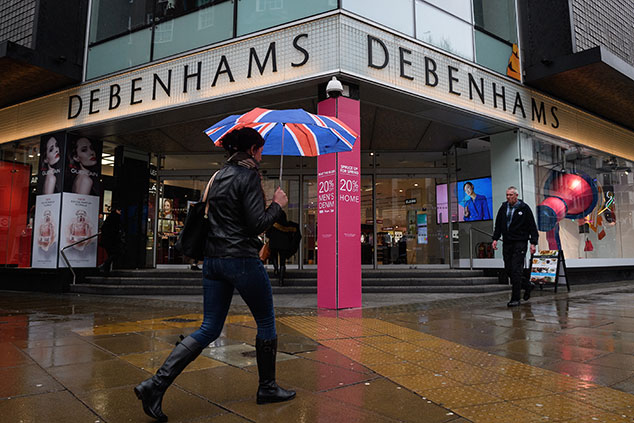
Debenhams’ “four-month battle with Sports Direct and its billionaire founder Mike Ashley” is over, says Jonathan Eley in the Financial Times. The 206-year-old department store’s management has tipped it into administration in a “pre-pack deal” involving an immediate sale to the group’s lenders, wiping out shareholders – including Ashley, who spent £150m on shares – but allowing the business to keep operating.
The move prompted a furious response from Ashley, whose “eleventh hour” offer of support was rejected. Ashley accused Debenhams’ advisers of “skulduggery” and said that they should “go to prison” for “undermining shareholders and other stakeholders”. Around 50 stores are expected to close, with Debenhams hoping to renegotiate leases on the rest.
“It’s been a good old-fashioned shoot-out,” says Ashley Armstrong in The Daily Telegraph. But Ashley’s “scattergun” approach has left him on the losing side. Instead of alternating between offering support and shouting at the board, he should have tightened his grip on Debenhams much earlier and bought into the debt rather than the stock. Under the insolvency regime, lenders “are in the driving seat”. He also squandered a chance to get involved in a debt-for-equity swap last year.
Ashley’s mixed record
This isn’t the first time that Sports Direct has had to write off a stockmarket investment in another company, says Sarah Butler in The Guardian. While Sports Direct “sees its strategic investments as a tool to gain influence over the boards of companies it is interested in working more closely with”, these have generally had a “mixed history”, with a few successful purchases outweighed by “ill-starred punts”. The most notorious of these was the $423m spent buying a 9% stake in Iconix Brand Group, “now worth just $8.1m”. Nevertheless, it seems a shame that Ashley’s takeover campaign went nowhere, says Andrea Felsted in Bloomberg.
After all, “lenders are not natural retailers” and “won’t be disposed to making the long-term investment needed to nurture the business back to recovery”. They’ll “also be more inclined to strip out assets… perhaps by selling off Debenhams’ Danish department store chain Magasin du Nord’.
By contrast, Ashley “is an experienced retailer” and there “could be operational synergies” from merging Debenhams with House of Fraser (which Ashley also owns). Fortunately, there is still a chance that he could try and buy Debenhams cheaply, “pouncing if either the board or lenders slip up”. For now, though, the story at Debenhams is likely to be one of “store closures and lease negotiations”, says Sebastian McCarthy in City A.M. In the longer term, its owners need “to work out what its brand offers that others do not” and find a way to allow it to “justify selling products at full price” rather than the endless sales that it keeps running.
Facebook faces margin squeeze
The idea of Facebook as “a neutral, global platform” may become a thing of the past as countries begin to impose their own standards for acceptable content, says Liam Proud for Breakingviews. On Monday, home secretary Sajid Javid outlined plans for a “statutory duty of care” on social-media sites, search engines and messaging apps designed “to protect their users”.
It suggested that “an independent regulator could fine the likes of Facebook and its senior managers for failing to remove harmful posts”. But the problem with that notion of “unacceptable content” is that it’s “ill-defined”, while a lack of single global standards could create “a balkanised” internet. “Hosing out the grubbiest corners” of the internet “will be labour intensive”, says Lex in the Financial Times.
So it is no surprise that Facebook, which recently hired 15,000 extra content moderators, thinks future operating margins will be in the mid-30% range, compared with last year’s 45%. That’s one reason why its shares fell further on the news and are now trading at $175, down 20% from their peak last summer. Still, the fact that smaller firms will be hit harder by the new regulations means they could “widen the moat protecting big tech companies from upstarts, even as it increases their costs”.
Another reason Facebook shouldn’t be too worried is that it’s going to take time to set up an effective regulatory system, says Nils Pratley in The Guardian. Even in the relatively static financial sector, proper regulation “is not a small undertaking”.
City talk
• The death of Cho Yang-ho, the chairman of the South Korean group that controls Korean Air, caused shares in the main holding company to surge by more than a fifth. Investors hope the Cho family’s grip on the company will loosen, say Kyunghee Park and Sohee Kim on Bloomberg. Before Cho’s death, shareholders at the conglomerate, tired of “scandals involving family members” – including allegations of embezzlement and tax evasion – forced Cho to stand down as CEO. This activism follows a wider trend of “assertive minority investors demanding more accountability from controlling families”.
• Carlos Ghosn, who is currently in jail awaiting trial, has been “formally kicked out of the company he saved from collapse 20 years ago”, says Alan Tovey in the Daily Telegraph. But ditching the former Nissan and Renault chairman doesn’t address the fundamental problem: “Nissan has massively outgrown Renault since the partnership was formed, causing resentment in Japan”. One obvious solution is a demerger: both firms are 50% less profitable than their stand-alone peers.
• Axing 1,600 jobs should help French banking giant Societe Generale “a little”, says Lex in the Financial Times. The redundancies from its barely profitable investment banking division will improve both its capital position and profitability by cutting costs by €500m. But much more “stripping down is needed”: SocGen’s equity capital ratio of 11% puts it behind most of its European peers. With SocGen needing to raise another €8bn of capital, shareholders should also expect more pain. To prevent the stock falling further, “it will need to make harsher decisions, both on costs and asset sales”.